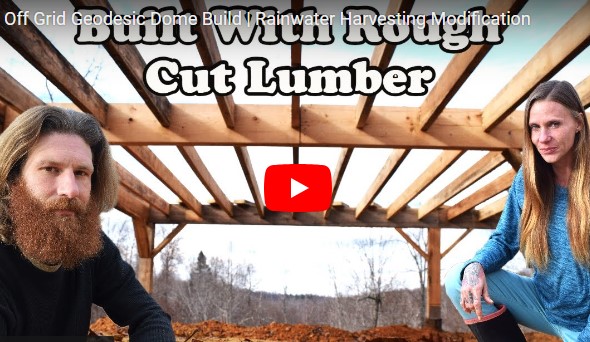Off-Grid Dome Homes: A Smart Choice for Sustainable Living?
Learn about how Dome Houses are energy efficiency, structural strong, and have sustainability benefits for off-grid living. We’ll also cover key considerations, such as building codes, construction skills, and financing, to help you determine if a geodesic dome is the right fit for your off-grid lifestyle. Watch the accompanying video to see the construction process and modifications for a fully self-sufficient home.
HOUSING
11/18/20243 min read


Off-Grid Dome Homes: A Smart Choice for Sustainable Living?
Introduction: In the quest for sustainable, self-sufficient living, off-grid enthusiasts are constantly looking for innovative housing solutions. Dome homes, particularly geodesic dome structures, have become increasingly popular among those seeking a unique, energy-efficient alternative to traditional housing. But is a dome home the right choice for your off-grid lifestyle? In this post, we'll explore the benefits, challenges, and considerations of living in a dome home and provide you with the information you need to make an informed decision.
Watch the Video: Off-Grid Geodesic Dome Build | Rainwater Harvesting Modification To better understand the process and benefits of building a geodesic dome home, check out this fascinating video that showcases a real-life dome build, including rainwater harvesting modifications for off-grid living.
Key Features of Dome Homes:
Energy Efficiency
Dome homes are known for their energy efficiency. The unique spherical shape of a geodesic dome naturally minimizes heat loss, making it easier to regulate indoor temperatures. This is a huge advantage for off-grid living, where maintaining energy use is crucial. Whether you’re using passive solar heating or a small off-grid heating system, the design helps reduce energy consumption and makes the most of the sun’s warmth.Structural Strength and Durability
One of the standout features of dome homes is their structural integrity. The geodesic design distributes weight evenly across the structure, making it incredibly resistant to harsh weather conditions such as high winds, heavy snow, or earthquakes. This durability makes it an ideal choice for remote locations where extreme weather can be a concern.Space Efficiency and Versatility
Dome homes maximize interior space. The absence of corners allows for an efficient use of floor space, making the interior feel more expansive than traditional rectangular homes of the same size. The open design also offers flexibility in room layouts, making it easier to customize your living space to suit your needs. Plus, the layout is ideal for creating communal living spaces or incorporating self-sustaining features like indoor gardening.
Benefits of Dome Homes for Off-Grid Living:
Sustainability
Dome homes are often built using sustainable materials such as reclaimed wood, straw bales, or insulated concrete forms. These materials help reduce the environmental impact of the build and contribute to a healthier living space. Additionally, dome homes’ natural ability to conserve energy helps reduce your carbon footprint over time.Cost-Effectiveness
Building a dome home can be significantly cheaper than traditional homes, especially when using eco-friendly materials or DIY methods. The simple design of the structure can lower the overall cost of construction, making it an appealing option for those on a budget. Plus, the energy savings over time make the investment in a dome home well worth it.Self-Sufficiency
Dome homes are a perfect fit for off-grid living because they can be easily integrated with renewable energy systems (like solar or wind power) and water collection systems. The small, efficient design makes it easier to go completely off the grid by reducing your energy and water needs. By adding rainwater harvesting, composting toilets, and off-grid power systems, a dome home can be a fully self-sustaining habitat.
Challenges and Considerations:
Building Codes and Zoning
While dome homes are innovative and efficient, it's important to consider local building codes and zoning laws. In some areas, geodesic dome homes may not be recognized as a standard form of housing, which could create challenges when it comes to permits and inspections. Always check with your local authorities before starting a dome home project.Construction Skills and Expertise
While some off-grid enthusiasts choose to build their dome homes themselves, it’s important to understand that this is a specialized skill. Constructing a geodesic dome requires knowledge of the materials, the design, and the techniques used to assemble the structure. If you don’t have the experience, hiring professionals or attending workshops on dome construction may be necessary.Financing and Grants
Financing a dome home can be tricky, as some banks and lending institutions may be hesitant to fund unconventional homes. However, there are growing options for those looking to build eco-friendly, alternative housing, including grants or low-interest loans. Investigate local programs or off-grid living communities that may offer financial assistance for your project.
Conclusion:
Dome homes are a revolutionary option for those looking to live off the grid, combining energy efficiency, strength, and sustainability. However, they come with their own set of challenges, such as navigating local building codes, acquiring the necessary construction skills, and securing financing. If you're passionate about sustainable living and are willing to put in the work, a dome home could be the ideal off-grid solution for you.
Ultimately, whether or not a dome home is right for you depends on your goals, your budget, and your ability to adapt to the unique needs of this unconventional housing style. If you're ready to embrace the off-grid life in a geodesic dome, the benefits of energy efficiency, durability, and self-sufficiency make it a highly attractive option.

